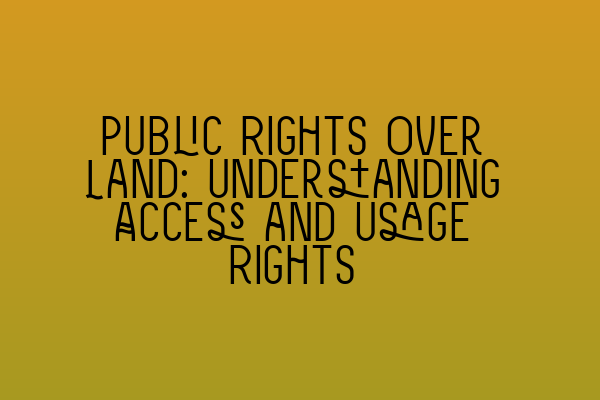Public Rights Over Land: Understanding Access and Usage Rights
As solicitors specializing in property law and land law, we at SQE Property Law & Land Law understand the importance of public rights over land. Access and usage rights play a crucial role in determining the rights and responsibilities of individuals and organizations in relation to land. In this blog post, we will provide a comprehensive overview of public rights over land, exploring the different types of rights, their legal basis, and their implications for landowners and the general public.
Before delving into the topic, it is important to have a clear understanding of what public rights over land actually mean. Public rights over land refer to the rights of individuals and the general public to access, use, and enjoy certain areas of land, even if the land is privately owned. These rights are typically established through legislation, common law, or long-standing traditional use.
One common type of public right over land is the right of way. A right of way is the legal right for a person or a group of people to pass through a particular piece of land, typically for the purpose of accessing another area. This right is often established through an easement, which is a legal right to use another person’s land for a specific purpose. Easements can be created by necessity, implication, or expressly granted through a legal agreement.
Public rights of way are crucial for ensuring the free movement of individuals and facilitating access to important locations such as public amenities, parks, and historic sites. Landowners must be aware of these rights and take them into consideration when managing their land. Failure to respect public rights of way can lead to legal disputes and potential liability for the landowner.
Another important aspect of public rights over land is the right to use land for recreational purposes. Many countries have legislation in place that grants the general public the right to access certain areas of land for recreational activities such as walking, hiking, cycling, and horse riding. These rights are often established through legislation such as the Countryside and Rights of Way Act.
The right to use land for recreational purposes is vital for promoting a healthy society, encouraging outdoor activities, and preserving natural landscapes. Landowners need to be mindful of these rights and ensure that their land is accessible and safe for recreational use. Restricting or impeding public access to land for recreational purposes can result in legal consequences and public backlash.
In addition to rights of way and recreational access rights, there are various other public rights over land that individuals and organizations need to be aware of. These include rights such as the right to fish, the right to roam, and the right to access coastal areas. Each of these rights has its own legal basis and specific regulations that govern their usage.
Understanding public rights over land is essential for landowners, property developers, and individuals involved in property transactions. Ignoring or disregarding these rights can lead to legal disputes, delays in development projects, and potential financial liabilities. Working with a knowledgeable solicitor who specializes in property law and land law can help navigate the complexities of public rights over land and ensure compliance with relevant regulations.
At SQE Property Law & Land Law, we offer comprehensive legal services to assist our clients in all aspects of property law and land law. Whether you need assistance with property transactions, land disputes, or advice on public rights over land, our team of experienced solicitors is here to provide you with expert guidance and representation.
If you’re preparing for the SQE 1 exams, we recommend checking out our practice exam questions and practice mocks FLK1 FLK2 articles. These resources can help you familiarize yourself with the format and content of the exams, allowing you to better prepare and perform well on the day of the test.
For those preparing for the SQE 2 exams, we offer specialized preparation courses designed to equip you with the necessary knowledge and skills to excel in your exams. Our courses cover all relevant topics, including property law and land law, ensuring you have a solid foundation for success.
To stay updated on the latest SRA SQE exam dates and other important information, be sure to visit our website regularly. We provide comprehensive information on exam schedules, registration deadlines, and any updates or changes to the exam format.
In conclusion, public rights over land are an integral part of property law and land law. Understanding the different types of rights, their legal basis, and their implications is crucial for landowners, property developers, and individuals involved in property transactions. By working with experienced solicitors who specialize in property law and land law, you can ensure compliance with relevant regulations and navigate the complexities of public rights over land effectively.
To learn more about our legal services and how we can assist you, please visit our website or contact us directly. Our team is ready to provide you with expert advice and representation tailored to your specific needs.
